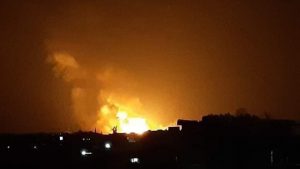Massive Israeli airstrikes after midnight Tuesday targeted a number of sites in Syria near the Iraq border, an area with a major Iranian military presence that is believed to be used by Tehran to move weapons throughout the region, Syrian media reported.
The strikes, which reportedly targeted more than 15 Iran-linked facilities, were the fourth reported attack by Israel against Iranian targets in Syria in the past two weeks, a significant increase from the normal rate of such strikes.
According to Syria’s official SANA news agency, the strikes targeted sites in the areas of Boukamal and Deir Ezzor in eastern Syria, where there is a major presence of Iranian-backed militias. Though not unprecedented, alleged Israeli strikes on targets near the Syrian-Iraqi border are uncommon, due to the challenges of conducting such operations far from Israel, which likely accounts for the large numbers of targets struck in the raids.
SANA said officials were assessing if any damage or casualties were caused.
A senior US intelligence official with knowledge of the attack told the Associated Press that the airstrikes were carried out with intelligence provided by the United States and targeted a series of warehouses in Syria that were being used as a part of the pipeline to store and stage Iranian weapons.
The official said the warehouses also served as a pipeline for components that supports Iran’s nuclear program. It was not clear if this was meant to indicate that such nuclear components were targeted in Wednesday’s strikes or if this referred to past uses of these same facilities.
The reported strikes came hours after Defense Minister Benny Gantz visited the Syrian border, where he said Israel would continue to take action against its enemies “near and far.”
“We aren’t sitting around and waiting. We’re active defensively, politically, and economically,” he said.
Europe-based Syrian expert Omar Abu Layla, whose news organization DeirEzzor24 maintains researchers on the ground in Syria, reported that the Israeli strikes hit at least 16 distinct targets associated with Iran’s Islamic Revolutionary Guard Corps, Lebanon’s Hezbollah and a number of other Iran-backed Shiite militias.
The Britain-based Syrian Observatory for Human Rights, a pro-Syrian opposition organization, said that the strikes hit 18 facilities and that 23 fighters were killed, seven of them Syrian soldiers and the rest “militia fighters allied with Iran.”
Though other news outlets in Syria reported that there were casualties in the strikes, those figures could not be verified and were not reported by official sources in Syria. The Observatory has regularly been accused by Syrian war analysts of inflating casualty numbers, as well as inventing them wholesale.
The Israel Defense Forces had no comment on the late-night strikes, in accordance with its policy to neither confirm nor deny its operations in Syria, save for those in retaliation for an attack from the country.
The area targeted has reportedly been repeatedly struck by Israel in recent years as it houses a number of bases used by Iranian-backed groups and is key to a land corridor for Tehran that links Iran across Iraq and Syria through Lebanon, which Iran uses to smuggle in weapons and rockets, mainly to the Hezbollah terror group.
The strike comes after reports last week that Israeli jets hit targets near Damascus.
The IDF has launched hundreds of strikes in Syria since the start of the civil war in 2011 against moves by Iran to establish a permanent military presence in the country and efforts to transport advanced, game-changing weapons to terrorist groups in the region, principally Hezbollah.



